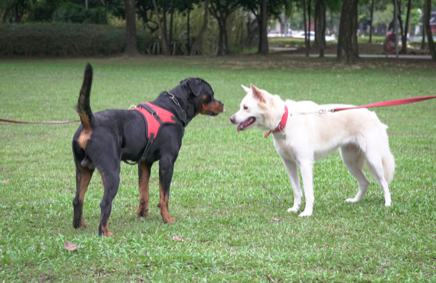The Importance Of Socialisation For Dogs

Dogs are pack animals and are used to socialising with other dogs on a regular basis in the wild. By domesticating them we have removed this natural instinct, so we need to ensure they are socialised from a young age in order to build their confidence around other pets and people. In this blog, we are going to explore the importance of socialisation for dogs.
Start Them Young
The key window for socialising dogs is when they are between 3 and 12 weeks old, as puppies are more receptive to new experiences at this age. Puppies are naturally inquisitive and are fascinated by new sensory stimulation at this age, so using this natural curiosity to your advantage is key. By giving them lots of positive experiences, they are less likely to be anxious, fearful, or suspicious when they go to new places.
Older dogs can still be socialised too, particularly if they are struggling with accepting new experiences and need some confidence instilled into them. The more positive reinforcement you can provide them, the more likely they will learn that new experiences can be fun. Older dogs also don’t get as distracted as puppies, so tend to learn more quickly.
Benefits of Socialisation For Dogs
1. Improves confidence
Socialisation is a great way to improve your dog’s confidence. Rather than cowering behind you when approaching an unfamiliar situation, a socialised dog will go in with their tails wagging, curious but relaxed. They will also take trust from their owner when experiencing stress, such as when visiting the vet.
2. Reduces fear and anxiety
Dogs that aren’t socialised are likely to develop phobias or anxiety, which can then lead to negative reactions. Fearful dogs are more likely to show signs of aggression or disruptive behaviour if they are unsure of a new situation. By socialising dogs and exposing them to a wide range of experiences early on in life, they will realise that new experiences are not scary.
3. Improves health
If dogs are regularly exposed to new experiences, they are unlikely to experience stress and anxiety. Chronic stress can lead to a range of health problems in dogs, such as a compromised immune system. Happy, relaxed dogs are much healthier overall.
How To Socialise Your Dog
The main way to socialise your dog is to use positive reinforcement when introducing them to new experiences. Praising and playing with them can help them feel relaxed and comfortable, allowing them to enjoy the experience. Don’t force a dog into a situation they are scared of as this can cause them to be aggressive. Instead, gradually introduce them to the new experience in a controlled, safe way.
Try and keep the socialisation varied too – exposing your dog to as many new experiences when they are young is ideal. This can include new environments (parks, beaches, busy footpaths) and also different people (children on scooters, adults, cyclists).
Regular interaction with other dogs and people is really important, things like puppy classes are a great way to socialise your dog. Alternatively, arrange some puppy play dates with your friends and other dogs that live around you as this will help them learn how to interact positively.
Role of Owners During Socialisation For Dogs
As an owner, it is really important that you take socialisation seriously and use a lot of positive reinforcement so your dog knows they are doing the right thing. Understanding your dog’s body language is really key so you can prevent them from entering an experience they may find stressful. Taking socialisation at the right pace for your dog is key to keeping them safe and happy.
For tailored advice and training sessions, our expert team at WitsEnd is on hand. Working with people from all over the country, we have had over 2000 success stories! To book an appointment or for more information, please call us on 0116 244 2455.